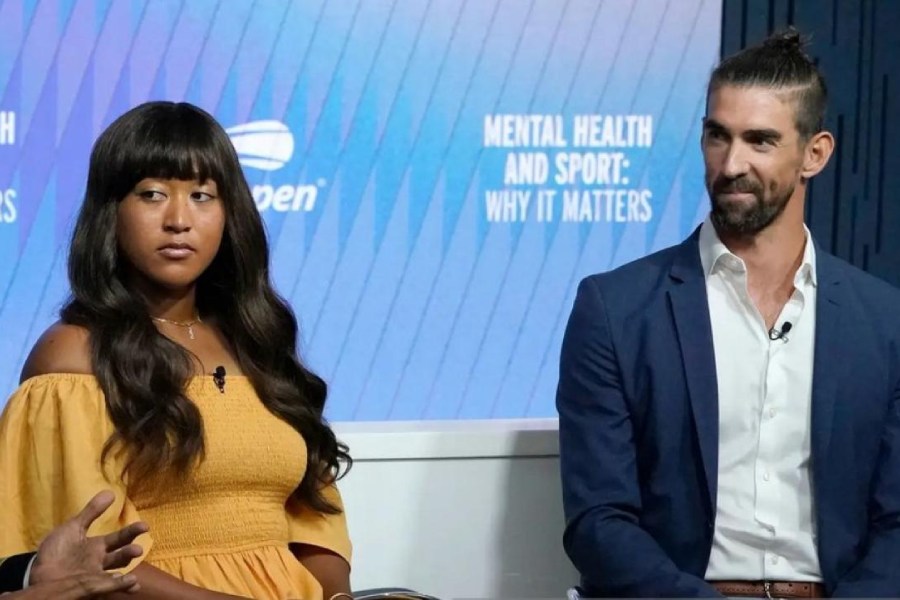Naomi Osaka didn’t bring any racquets with her when she arrived at the Billie Jean King National Tennis Center on Wednesday afternoon. Osaka had no plans to play tennis.
“For me, coming back here, it means a lot,” said Osaka, a four-time grand slam singles champion. “It’s like seeing an old friend that you haven’t seen in a long time.”
Osaka was speaking in the main news conference room on Wednesday inside Arthur Ashe Stadium. She knows it well. It’s where she got to field questions from reporters on some of her best occasions, like her US Open championships in 2018 and 2020. It’s also where she has been during low moments, including a first-round exit at last year’s tournament.
“There were some tears shed,” Osaka said about the room. “A lot.”
On Wednesday, Osaka had returned for a panel with Michael Phelps, the American swimmer who stands as the most decorated Olympian ever, Dr Vivek Murthy, the surgeon general and Dr Brian Hainline, the chief medical officer of the National Collegiate Athletic Association (NCAA) and the chair of the US Tennis Association board.
The topic of the panel, mental health and sports, is one that Osaka has spoken about often since she cited mental health concerns in her withdrawal from the French Open in 2021. Her exit then led to a break from tennis.
Osaka, who turned pro in 2013 as a teenager and came to be seen as the heir apparent to Serena Williams, is away from tennis now, too. In January she announced she was pregnant but planned to play in the 2024 Australian Open. She gave birth to her daughter in July, calling it on Instagram “a cool little intermission.”
On Wednesday, Osaka, 25, said she had plenty of time to reflect during her most recent leave from the sport.
“It definitely made me appreciate a lot of things that I took for granted,” she said.
Osaka did not say when she planned to return to tennis during the panel, but she later told ESPN in an interview that she had designs on playing in 2024, adding that she has been training and should be hitting balls soon.
Speaking back in that room, Osaka alluded to the idea of having a long career.
“I just remember watching the Australian Open and being very devastated because I’ve never missed an Australian Open,” Osaka said.
But while watching, Osaka said, she thought about how late Serena and Venus Williams played into their careers.
Serena Williams, who retired at last year’s US Open, played until she was 40. Venus Williams, 43, played at this year’s tournament, losing in the first round of singles.
“I was thinking I probably no way will ever play at their age,” Osaka said. “But sitting here, I’m like, you know what? I might do that.”
Osaka said pregnancy gave her a lot of time to think, and that she felt isolated at times. She had to force herself to ask for help.
She added: “Normally I’m thinking, ‘If I’m going to be an independent woman, then I’m not going to ask anyone for help. Whenever something happens, just take it on the chin.’ But then I got to a place where I needed to ask for help.”
For decades, many athletes have been reluctant to share their struggles with their mental health. But in recent years, athletes have gradually become more open about discussing mental health. Besides Osaka, they include gymnast Simone Biles, basketball star Kevin Love, and, in tennis, Amanda Anisimova, the young American once ranked in the top 25 who in May cited mental health concerns in deciding to step away from the sport.
Among Olympians, Phelps has also led a push to speak out on mental health.
Phelps, who has also faced mental health issues, said that, like for Osaka, working through those problems required realising he had to reach out and ask for help.
“I learned that I couldn’t do it all by myself,” Phelps said.
After winning six gold medals at the 2004 Athens Games, Phelps entered what he described as a “post-Olympics depression.” But instead of reaching out to someone for help, Phelps said, he compartmentalised his issues by swimming and training more.
It wasn’t until about 2014, Phelps said, when he hit a “breaking point.”
“I decided that something had to change,” he said. “So for me, I had to become vulnerable for the first time in my life.”
Osaka said that she had two friends she counts on when she is dealing with loneliness.
“I know I can reach out to them at any time, and I think it’s really important,” she said. “You’re not alone in anything.”
New York Times News Service











